|
When I was in 8th grade, I helped teach for my parish’s religious education program and counted the hours toward my required community service time before receiving the Sacrament of Confirmation. I was an assistant for the 5th grade, and I thought it was the coolest thing. I could share with the class what I knew about the Church, even teaching them at one point how to pray the Rosary. Looking back, it seems like I was destined to teach in a Catholic school! After college, I began working at my current school in the Archdiocese of Washington (ADW), where I continue to teach and share my faith with the students. To this day, I continue to teach religion. I strive to form my students as disciples according to six elements of Catholic life: Knowledge of the Faith, Liturgy and Sacraments, Morality, Prayer, Education for Living in Christian Community, and Evangelization and Apostolic Life.
For catechists who actively pass on the Word of God to others, teaching the faith can become almost second nature. For instance, at my school, we incorporate core Jesuit principles into the curriculum each day and reflect on our own actions through prayer. In my pre-K classroom, we use these principles to talk about kindness and loving others as St. Ignatius taught. In a special way, my students are learning how to be good friends and love others the way Jesus did. In the Archdiocese of Washington (ADW), the religious curriculum has standards by which its content is measured and assessed—like any other subject area in school. In fact, ADW is trying to support catechists to do more to collaborate and keep kids engaged and excited about learning their faith. Professional development of catechists is crucial to a school, parish, or community. Learning how to be better witnesses of the faith ensures that our children are receiving the best formation of conscience they can get. Although there are people certified and educated to teach as catechists, most of us are already fulfilling that duty as faith-filled adults in the Church who witness to and spread the Gospel. Below is a list I have compiled of a description of a catechist. After reading it, do you feel called to become one?
For more information, we invite you to view the following webinar at the bottom of the page:
Question for Reflection: How can you teach the faith to others in your everyday life? *This post was originally published in May 2017*
0 Comments
It’s 4:30 in the morning and my husband and I are awoken by cries from our 11-month-old son in his room. He has taken to an early wake-up for quite a few weeks and despite knowing that he’s been sick and teething and that babies simply have no schedule but their own, I think to myself, “Shouldn’t he be sleeping through the night?” My husband brings him to me to nurse and slips back into bed. Although this trial of losing sleep is trivial I pray, “Lord, we have given up everything and followed you.”
The other day we got the news that our car needs another expensive repair. My husband and I analyzed our budget: there’s the mortgage, daycare, food, regular car expenses, and student loans. We also want to have more children and show them the world, and we want to give so much more to our community than we currently are, but where is there room in our constantly strained budget? I express my fear and I cling to the words, “Lord, we have given up everything and followed you.” Today’s Gospel catches us right after a rich man asks Jesus what he must do to inherit eternal life, and “Jesus, looking at him, loved him and said to him, ‘You are lacking in one thing. Go, sell what you have, and give to [the] poor and you will have treasure in heaven; then come, follow me’” (Mark 10:21). I can hear Peter, filled with earnest love and total concern as he looks up to Jesus and begins to say the opening line of today’s Gospel: “We have given up everything and followed you.” He has left his family and career to serve Jesus. He is traveling with these men and learning from Jesus every day. His faith is tested, and he fails multiple times – walking on and beginning to drown in the sea and eventually to deny the Lord not once, but three times over at His Passion. Despite these failings, I imagine the Lord’s tenderness and faithfulness as he looks to Peter and says: “Amen, I say to you, there is no one who has given up house or brothers or sisters or mother or father or children or lands for my sake and for the sake of the gospel who will not receive a hundred times more now in this present age: houses and brothers and sisters and mothers and children and lands, with persecutions, and eternal life in the age to come. But many that are first will be last, and [the] last will be first.” (Mark 10:29-31) This is the promise of the Christian life: the gift of hope that comes with the witness of the Gospel and the life of Christ. Despite our sufferings, trials, and sacrifices, there’s the promise of eternal life with Jesus where every ache of our heart will be healed and every thirst satiated. Consider the fear and hurt, for example, of those who feel called to marriage, but haven’t yet found “the one.” Or how about the tears an infertile couple might shed for all the babies they have never held? God fills these holes and seals them one hundred times over. Even something that seems trivial, such as a failing grade, a mistake at work, or sleep lost during a 4:30 a.m. nursing session – even those losses will be fulfilled in ways that we cannot imagine. It’s hard to fathom how that wholeness is possible in our broken world, but as Jesus reminds us: “All things are possible for God” (Mark 10:27). In contemplating Jesus’ promise to us, this call to the Christian life, and our goal of striving towards heaven, we know that this work is not easy or glamorous, but it can be holy if we let it. In your everyday yeses to sacrifices big and small, God promises you a lifetime with Him. Do not lose hope when you make a sacrifice or you feel the hurt in your heart: it is seen and felt and loved by the Lord. He uses those feelings to bring you closer to Him and His promises. He wants to love you in your sacrifices. The Lord promises to bring His goodness through your holy work as you choose Him each day (Romans 2:6-10). And it is in that love that we can sacrifice with the confidence of Christian hope and gratitude, “Lord, we have given up everything and followed you.” Alyce Shields is a teacher in Washington, D.C. On Trinity Sunday, one cannot help but think of a common greeting heard at Mass, “Let us begin as we wish to begin all things. In the name of the Father, and of the Son, and of the Holy Spirit. Amen.” How many times have we made the Sign of the Cross? Why do we begin Mass (indeed, every prayer) with the Trinity? Perhaps Trinity Sunday is the perfect day to ask, what does it all mean?
During a General Audience, Pope Francis remarked, “The Mass begins with the Sign of the Cross. The whole prayer moves, so to speak, within the space of the Most Holy Trinity…” Perhaps we should look at the actions of the Trinity to see what God has done for us and thus see the true power of those words. A favorite hymn sung on Trinity Sunday begins, “O God Almighty Father, Creator of all things, The Heavens stand in wonder, While earth Thy glory sings.” Everything, from the smallest pebble to the tallest mountain and every living creature in between, is the result of God’s generative power. As the Catechism points out, “the totality of what exists depends on the One who gives it being” (CCC 290). And so, when we begin “In the name of the Father,” we remind ourselves of the awesome power God has to create everything from nothing. The second verse of the hymn goes, “O Jesus, Word Incarnate, Redeemer most adored, All Glory, praise and honor, Be Thine, our Sovereign Lord.” St. Paul reminds us, “In him we have redemption by his blood, the forgiveness of transgressions, in accord with the riches of his grace” (Eph 1:7). By his death and resurrection, Christ opened the doors of heaven for the faithful. The third verse says, “O God, the Holy Spirit, Who lives within our souls, Send forth thy light and lead us to our eternal goal.” The Catechism states, “By virtue of our Baptism, the first sacrament of the faith, the Holy Spirit in the Church communicates to us, intimately and personally…” (CCC 683). It is by the Holy Spirit that the knowledge of our faith is revealed to us. And it is through the inspiration of the Holy Spirit that we are able to live out our faith in the hope of reaching heaven. One thing that should be noted when talking about the Persons of the Trinity, is that while the Father, Son, and Holy Spirit may be three distinct Persons, they are still of one nature. This is what we mean in the Nicene Creed when we say that Christ is “consubstantial with the Father”—they are distinct but are of the same substance. The Father, Son, and Holy Spirit are each wholly and entirely God. Many times, when we talk about the Trinity, we appropriate certain actions to each Person, i.e. God the Creator and Christ the Redeemer. This is fine, so long as we remember that the Father alone did not create, nor did the Son himself redeem. All actions are done in concert as one Triune God. On this Trinity Sunday, when we make the Sign of the Cross, let us do so remembering what that action reveals – that God created all things, that through Him the gates of heaven are opened to us, and that with Him our faith is revealed. And let us always sing the chorus of that hymn we used above: “O most Holy Trinity, Undivided Unity; Holy God, Mighty God, God Immortal, be adored.” Questions for Reflection: Is there a Person of the Trinity that you go to most frequently in prayer? How can you continue to build your relationship with each Person of the Trinity? Victor David is a collaborator with the Catholic Apostolate Center and a staff member at The Catholic University of America in Washington, DC. Dear future volunteer,
Each time I revisit the Ascension stories in the Gospels, I find numerous points that relate to mission and service. Throughout my own time on mission in Jamaica, I see similarities between these verses and my challenges and blessings in a daily life of service. I hope to offer encouragement to you, future volunteer, as you research and discern the many opportunities for service available to you. “He rebuked them for their unbelief and hardness of heart…” (Mark 16:14) My strongest prompt to mission came as I reflected on a painting of St. Francis gazing at the cross and being told to rebuild the church. The question written with the painting asked, “Am I willing to do God’s will?” For many years, I have read, heard, and tried to practice in small ways, the example of Jesus doing the “will of my Father,” and loving others as God loves me. Now I felt that God had put the nudge toward mission into my heart. Two years of overseas mission service seemed like a very big step into the unknown but I had the stories of Francis and many others as examples, and I felt that if I said “Yes,” God would enable me to shed my worries and, thus, soften my heart and make more room for his Grace! Future volunteer, God will do the same for you. Mission has taught me to expect the unexpected and to trust in God’s plan. Though I was open to other ministries, there was a pretty high expectation at my future mission site that I would be helping in schools, and that is exactly where I found myself. My first classroom was noisy, chaotic, cramped, and undersupplied, but I found that I had the most difficulty countering the common teaching approaches, which I perceived as overly physical and sometimes belligerent. During the first days and weeks, it was very easy for me to get caught up in the prevalent practice of shouting, derision, and physically putting someone into their chair or the corner. I didn’t like myself doing that. Continually, readings in the Franciscan prayer book kept telling me that Peace IS the path. One time, a student told me that he didn’t like me putting him into his seat. The next day, I got down to his eye level and apologized to him. He listened, we hugged, and I felt that I was on my way toward a better practice. Future volunteer, are you ready to be stretched and molded according to God’s will? “The eleven disciples went to Galilee, to the mountain to which Jesus had ordered them.” (Matthew 28:16) I always notice the number eleven here; it is a particular mention to the fact that someone is missing. Dear future volunteer, are you worried about leaving your loved ones to do service? There are times when I am missing someone familiar from my table. It is different people at different times and my heart misses them. The last phrase—”to which Jesus had ordered them”—strikes me as being particularly relevant to mission and service. What are Jesus’ orders? Feed the hungry, clothe the naked, go and make disciples of all nations. Mission is an opportunity to do just that. My heart believes that God does and will take care of me while on mission, and the Almighty and Universal God is also able to care for my loved ones even when they are on a different continent! “He led them out to Bethany...They did him homage and then returned to Jerusalem with great joy and they were continually in the temple praising God.” (Luke 24:50-53) Dear future volunteer, as you discern your service, there is great help to be found in being “continually in the temple praising God.” I couldn’t have made my decision for mission without some serious prayer and reflection. The question of “Is this really God’s will?” was a focus for my Lenten prayer before I began my time of service. Contemplative silence and guidance from trusted friends helped me to find peace in the answer to that prayer. This ending of Luke’s Gospel account shows the disciples returning to the Temple, and I have reflected on how this seems to be the strength they needed before departing to their ministries that are recounted in Acts. “Jesus came and stood in their midst and said, ‘Peace be with you.’” (John 20:19; 21:22) Ahhh, my prayers were voiced and answered; my heart found peace, and my decision for mission was made. In John’s Gospel, Jesus breathes the Holy Spirit upon the disciples. In the next chapter, I see another of my tendencies: my desire to get a quick summation of God’s plan. Peter wants to know about the future for the Beloved disciple…(nudge, nudge, wink, wink) and he is gently reminded by Jesus, “What concern is it of yours? You follow me.” The disciples encounter the resurrected Jesus in their everyday lives while fishing, walking, eating, and interacting with others. As my mission time unfolds, I also see Jesus in everyday life. I see him in the faith voiced in the locals that I meet and in new forms of singing and praise. I feel discouragement at the discrepancy of incomes and lack of faith just as Jesus felt while gazing at Jerusalem. I marvel to see God’s hand in creation as I walk by household gardens or explore the hills. And, like the disciples, I see Jesus working through me, giving me a stronger dependence on prayer as I realize that I will not be able to fix systemic problems, and a stronger sense of humility as I realize that I am an outsider here, but I truly have been sent by God. Jesus ascended and asked his disciples to go and teach all nations. Mission service makes us a viable part of that eternal and mystical plan. Jesus may have disappeared into the clouds, but we are able to make his presence real today. I really think that He was having a good chuckle as He ascended. He knew how much mission would change us! Dear future volunteer, are you ready to be changed? To learn more about service opportunities through Franciscan Mission Service, please click here. This reflection was originally published on the Catholic Volunteer Network Blog and was posted with permission. Janice Smullen is a recently returned missioner with Franciscan Mission Service. She most recently served in Kingston, Jamaica. A second wind is often an unexpected gift. Whether it is discovered during a run, study session, or some other activity demanding intense focus and effort, what at first seems daunting and impossible to achieve suddenly becomes possible thanks to newfound strength and endurance. A second wind, while surely appreciated physically or mentally, can also be applied spiritually. As the Church celebrates her birthday on Pentecost Sunday, we can reflect on the incredible gift of the Holy Spirit who was sent by God Himself to provide the fledgling Christian faith a much needed second wind as apostles prepared to bring the Good News of Christ to the entire world.
One of the Gospel readings for Pentecost details our Lord’s promise to send the Holy Spirit to His disciples. In an earlier related chapter from John’s gospel, Christ Himself walks with the disciples and predicts His own Passion. He assures the disciples that they will not be abandoned as orphans, but will share in the very life of the Most Holy Trinity (John 14:15-31)! The consolation and comfort Jesus brought to those gathered in the Upper Room after His death and resurrection surely reminded them of this though He ordered them to not leave Jerusalem until “the promise of the Father” had been sent (John 20:19-23). It would not be until after Christ’s ascension, that the Holy Spirit would be sent upon the disciples and so enable them to carry out the Great Commission of our Lord, “Go therefore and make disciples of all nations, baptizing them in the name of the Father and of the Son and of the Holy Spirit, and teaching them to obey everything that I have commanded you.” While Christ had sent out the disciples to evangelize before (see Luke 10:1-20, cf. Matthew 10), these efforts were limited to “the lost sheep of the house of Israel.” Proselytizing the rest of the world would take place after the rejection of our Lord and would require grace to sustain the disciples through this incredible evangelical endeavor. Today, the faithful are not only entrusted with this mission, but have also been baptized and confirmed with the same Holy Spirit as was promised to Christ’s first followers! The Holy Spirit is truly God and is inseparable from the Father and the Son. Though Christ is seen, it is the Spirit who reveals Him. Thus, both are on a “joint mission” to reveal the visible image of the invisible God (see CCC 689). The Holy Spirit invites us to better know the Father and Son. Each person of the Trinity more fully deepens our understanding of God. As the Catechism says: Now God’s Spirit, who reveals God, makes known to us Christ, his Word, his living Utterance, but the Spirit does not speak of himself. The Spirit who “has spoken through the prophets” makes us hear the Father’s Word, but we do not hear the Spirit himself. We know him only in the movement by which he reveals the Word to us and disposes us to welcome him in faith. The Spirit of truth who “unveils” Christ to us “will not speak on his own.” (CCC 687) The Holy Spirit continuously reveals Christ to us when we make an effort to listen. Similarly, when we recognize and cooperate with the Holy Spirit dwelling within us, we are better able to contemplate Christ’s teachings and the great Mysteries of Faith. When we face discouragement or are unsure of a decision we must make, we are in similar circumstances to those waiting in the Upper Room. The gifts of the Holy Spirit strengthen our faith and helps us to judge our situations prudently. The courage to continue Christ’s mission and not be defeated by discouragement or rejection is not only an incredible witness to the Church, but also a recognition that the Holy Spirit continues to work among us wherever we are in our journey of faith! Just as the Holy Spirit descended upon our Lord at His baptism to start His mission on earth, so too did Christ send the Holy Spirit upon the disciples in the Upper Room as they began their ministry. Like the disciples, let us dare to be open to the Holy Spirit’s activity in our daily lives as a much needed second wind as we continue our Lord’s work so that at the end of our days, we may hear spoken to us, “Well done, my good and faithful servant ... Come, share your master’s joy.” Question for Reflection: Can you recall a moment when the Holy Spirit gave you the courage to continue through a difficult trial? Today ends a yearlong celebration of the Jubilee of the 200th Anniversary of the Ordination to the Priesthood of St. Vincent Pallotti. In celebrations in 54 countries around the world and beyond, Pallotti’s foundation, the Union of Catholic Apostolate, is offering thanks for his life of selfless ministry. Ordained on May 16, 1818 as a priest of the Diocese of Rome, Pallotti served his entire life in the city, especially through pastoral care of the poor, sick, prisoners, and dying, spiritual direction, education, and sacramental ministry, particularly the Eucharist and Penance. Through reviving faith and rekindling charity as a priest always in collaboration with others, he was inspired 17 years later to found an association of lay people, religious and clergy that would assist the Church’s missionary efforts, revive the faith of Catholics, and live universal charity. He called it the Union of Catholic Apostolate. Only after almost 20 years of priestly ministry did he form a community of priests and brothers as well as a community of sisters. Both communities were small by the time of his death in 1850, but today are throughout the world. Fr. Jacob Nampudakam, S.A.C., the Rector General of the Society of the Catholic Apostolate (Pallottine Fathers and Brothers) in his book, The Spirit of the Priesthood according to St. Vincent Pallotti, summarizes well the way in which Pallotti went about his priestly ministry: “Vincent Pallotti from the very beginning of his priestly life, committed himself to live out all of the implications of the ministerial priesthood and revive its evangelical spirit. He interiorized the priesthood as a following of Jesus Christ and expanded his vision and put it into practice by means of priestly activities” (9). Pallotti in and through his priestly ministry lived the life of an apostle, a follower of Christ who is sent out into the world to share the Gospel in word and deed. As apostles, we are not alone, as Pope Francis notes: “I entrust all of you to the protection of Mary Most Holy, whom St. Vincent Pallotti venerated especially as Queen of Apostles. Her good example of apostolic zeal and perfect charity, invites us to pray without ceasing to invoke the gifts of the Holy Spirit upon the apostles of today, so that the Gospel of her Son can be proclaimed in every part of the world.” May the Charity of Christ urge us on! In Christ, Apostle of the Eternal Father, Fr. Frank
This year seems like a year of baby announcements for me! Just as I have prepared for the parade of invitations and happy save-the-dates for graduations and weddings, I’ve been preparing in my own way for the arrivals of friends’, parishioners’, and family’s little ones. With the arrival of spring, so too comes the arrival of brand new family members. At Mass recently, the choir began singing “What a Beautiful Name” during the Eucharistic procession. I couldn’t help but picture the new names and faces that would fill stories from now on. With each birth announcement came the first, middle, and last name along with weight, length, and time of birth. These surely were moments that changed so many lives forever! I could hear the parents and families singing this song for the new baby boy or girl. As I pictured the new names and faces, I prayed using the name that changed humanity–Jesus. Each verse of “What a Beautiful Name” builds upon the last. Jesus’ name is beautiful, wonderful, powerful. The melody and harmony invite you into a transformative reality. Jesus–who is the King, Savior, Son of God, Prince of Peace–knows your name and is present to you in the Eucharist (CCC 432). You didn't want heaven without us So Jesus, You brought heaven down Throughout the Old and New Testaments, we learn about the significance of names and the process of naming. Some names change as different Biblical figures embrace a new mission or vocation: like Abram, Jacob, and Simon. Listening to this song led me to reflect on those figures in Scripture and on Jesus’ Paschal Mystery in light of the birth announcements. His is the only name through which humanity is saved—the name “above every name.” I hope to witness the love of Christ in these babies and in their unique names that are so meaningful. These names are written on the palms of His hand and show God’s unconditional love for His people and the love for His Son, Jesus. Yours is the Kingdom, Yours is the glory Yours is the Name, above all names This spring and Easter Season calls me to slow down and pray with the name of Jesus. I pray in thanksgiving for new life and new names. I pray for the hearts of these little ones and hope that they come to know and witness the beauty, wonder, and power in Jesus’ name. Question for Reflection: Try praying the simple prayer of Jesus’ name. Think of the history and significance of names in your life, the lives of family members, the saints, and scripture. How have each of these names influenced your faith? 5/9/2018 Everyday Holiness (Part 2): 10 Quotes from Pope Francis' Apostolic Exhortation to Help You Be Holy in Today's WorldRead NowOn April 9, the Solemnity of the Annunciation of the Lord, Pope Francis released his latest Apostolic Exhortation: Gaudete et Exsultate (Rejoice and Be Glad): On the Call to Holiness in Today’s World. This is the third Apostolic Exhortation of his papacy, following Evangelii Gaudium, the Apostolic Exhortation on the Proclamation of the Gospel in Today’s World and Amoris Laetitia, a post-synodal Apostolic Exhortation on Love in the Family. What was his goal? “To re-propose the call to holiness in a practical way for our own time, with all its risks, challenges and opportunities" (GE 2). Without delving too much into a theological or heady definition of holiness, Pope Francis invites us simply and straightforwardly to open ourselves to the specific and unique mission God has created us for. In this, he says, lies true joy and freedom. Our Holy Father takes us back to the Source of Holiness, Jesus Christ, and encourages us to look to the Beatitudes as guides for holiness. Below, I’ve compiled some of my favorite quotes and key take-aways from this approachable, yet profound, exhortation. 1.“A person’s perfection is measured not by the information or knowledge they possess, but by the depth of their charity.”-GE 37 It is tempting to leave the task of holiness to theologians, the clergy, or those who work for the institutional Church. Here, Pope Francis reminds us that holiness is not all about intellectual knowledge, our ability to quote the latest Church document, or the Catechism. While knowledge of the Faith certainly is important, our holiness is measured by the amount of love with which we infuse all of our actions. I can’t help but think of St. John of the Cross’s quote: “In the twilight of life, God will not judge us on our earthly possessions and human successes, but on how well we have loved. 2. “Jesus explained with great simplicity what it means to be holy when he gave us the Beatitudes (cf. Mt 5:3-12; Lk 6:20-23). The Beatitudes are like a Christian’s identity card…In the Beatitudes, we find a portrait of the Master, which we are called to reflect in our daily lives.” -GE 63 I love that Pope Francis ultimately leads us to Scripture and to Jesus Christ Himself as the model and teacher of holiness. It can get overwhelming trying to be holy and define holiness in our modern world. The Beatitudes, Pope Francis says, are like a “Christian’s identity card.” They point us directly to holiness and guide us along the way. Spending time reflecting on each of the Beatitudes will help us to better understand what it means and looks like to be holy. 3. “It is true that the primacy belongs to our relationship with God, but we cannot forget that the ultimate criterion on which our lives will be judged is what we have done for others. Prayer is most precious, for it nourishes a daily commitment to love. Our worship becomes pleasing to God when we devote ourselves to living generously, and allow God’s gift, granted in prayer, to be shown in our concern for our brothers and sisters.” –GE 104 Here, Pope Francis is reminding us that our prayer must lead to action. We cannot be holy in a vacuum, but are called to live out holiness amidst our brothers and sisters. Service to the world, as promoted by Catholic Social Teaching, is crucial if we are to be true followers of Christ. While our relationship with God always comes first, this relationship turns our gaze outward in order to foster and build relationships of love, service, and communion with our brothers and sisters. 4.“Far from being timid, morose, acerbic or melancholy, or putting on a dreary face, the saints are joyful and full of good humour. Though completely realistic, they radiate a positive and hopeful spirit.” -GE 122 Holiness leads to joy – this is the true fruit of our living a holy life. As Christians, we are called to exude the joy of the Resurrection and of the Gospel in the midst of a world plagued by sin, brokenness, and suffering. While holiness is joyful, is does not exist in an alternate reality, but embraces the truth of the world in which we live. Pope Francis says that this holiness is “realistic” and allows us to engage the world while still looking beyond it to the glory of eternal life. 5. “God is eternal newness. He impels us constantly to set out anew, to pass beyond what is familiar, to the fringes and beyond. He takes us to where humanity is most wounded... God is not afraid! He is fearless! He is always greater than our plans and schemes. Unafraid of the fringes, he himself became a fringe (cf. Phil 2:6-8; Jn 1:14). So if we dare to go to the fringes, we will find him there; indeed, he is already there.” –GE 135 The theme of going outside our comfort zone has been one Pope Francis has promoted since the beginning of his papacy. He calls us as Christians and as the Church to wake up, open our doors, and shake the dust off ourselves by imitating God who is “eternal newness.” Holiness, therefore, means being active, bold, and unafraid. It means meeting Christ in the fringes of society and finding him outside the confines of our Church walls. 6.“Let us allow the Lord to rouse us from our torpor, to free us from our inertia. Let us rethink our usual way of doing things; let us open our eyes and ears, and above all our hearts, so as not to be complacent about things as they are, but unsettled by the living and effective word of the risen Lord.” –GE 137 Here, Pope Francis continues to invite the Church to an examination of conscience. Are we doing things out of habit, because we’ve always done something a certain way, or are we open to the promptings and workings of the Holy Spirit as we approach our task of holiness and evangelization? The example and word of Jesus Christ should always “unsettle” us to some degree. We do not achieve perfect holiness at some point in our life and then rest on our haunches! The journey lasts throughout our lifetime. 7.“Are there moments when you place yourself quietly in the Lord’s presence, when you calmly spend time with him, when you bask in his gaze? Do you let his fire inflame your heart? Unless you let him warm you more and more with his love and tenderness, you will not catch fire. How will you then be able to set the hearts of others on fire by your words and witness? If, gazing on the face of Christ, you feel unable to let yourself be healed and transformed, then enter into the Lord’s heart, into his wounds, for that is the abode of divine mercy.” -GE 151 I love this passage from Gaudete et Exsultate. Pope Francis takes on a more reflective tone here and invites us to be prayerful along our journey to holiness. He gets to the heart of holiness by asking us some profound but unavoidable questions. Essentially, he’s asking if we have truly encountered Jesus Christ and his infinite love. This is fundamental to holiness, for our encounter with Christ’s love is what will carry us forward on our journey and sustain us. Take some time to pray with these questions and ask the Lord for a deeper encounter with his love. 8.“For this spiritual combat, we can count on the powerful weapons that the Lord has given us: faith-filled prayer, meditation on the word of God, the celebration of Mass, Eucharistic adoration, sacramental Reconciliation, works of charity, community life, missionary outreach. If we become careless, the false promises of evil will easily seduce us.” –GE 162 As with any journey, we will encounter setbacks and temptations as we strive for holiness. Pope Francis devotes a section of his exhortation to the reality of evil and our need to acknowledge it. Pursuing holiness also means engaging in spiritual combat. We not only face our own weaknesses or the sins of others, we also face an actual opponent: the devil. Here, Pope Francis encourages us to count on “the powerful weapons that the Lord has given us.” We are not alone as we face evil, but find our strength in the Church, the sacraments, our brothers and sisters, etc. 9. "Discernment is necessary not only at extraordinary times, when we need to resolve grave problems and make crucial decisions. It is a means of spiritual combat for helping us to follow the Lord more faithfully. We need it at all times, to help us recognize God’s timetable, lest we fail to heed the promptings of his grace and disregard his invitation to grow." –GE 169 Discernment is a way of life. It means inviting the Lord into our actions and decisions and asking for his guidance as we go about our day. Pope Francis reminds us that discernment is not reserved only for major life decisions such as a move, our vocation, a job opportunity, etc. Discernment should be engrained into our spiritual life and helps to ensure that we are living our lives according to God’s plan rather than our own. 10.“Mary is the saint among the saints, blessed above all others. She teaches us the way of holiness and she walks ever at our side. She does not let us remain fallen and at times she takes us into her arms without judging us. Our converse with her consoles, frees and sanctifies us.” -GE 176 We cannot pursue holiness without looking to the perfect model of human holiness: the Blessed Virgin Mary. Pope Francis concludes his exhortation by inviting us not only to look to Mary, but to go to her and build a relationship with her. She always guides us closer to her Son. Mary is a gift to us given by Christ himself to journey alongside us on the path to heaven, don’t forget to use her as a resource! **This is part two of a two-part series of quotes from Pope Francis’ latest Apostolic Exhortation: Gaudete et Exsultate. For more information and resources on Gaudete et Exsultate, please click here. Questions for Reflection: How does Pope Francis challenge your idea of holiness? Do you agree with the Holy Father’s definition? Where do you see holiness being lived out today? Giving and gaining. These two words sum up my experience interning at the Catholic Apostolate Center. Over the course of the last four months, I feel like I have helped in assisting the advancement of St. Vincent Pallotti’s mission as expressed in the 21st century through the work of the Center. In return, I have gained a significant amount of experience that I intend to use in my future endeavors as a young Catholic engaged in social media. The Center’s goals are aimed towards forming Catholics who embrace the style of evangelization that Pope Francis has coined as “missionary discipleship,” and before him, what St. Vincent Pallotti called the “Universal Apostolate.” After several weeks of working with this team, I can safely say that I, too, have been impacted by the central message of the organization. Each week in passing, I became more confident in the idea that I am a missionary disciple.
To be more precise, I would like to address exactly how I’ve grown by participating in the Center’s mission. As a young Catholic already involved in social media evangelization, having worked on a small blog of my own creation, it was a true blessing for me to be offered the opportunity to work on a grander project in a more professional environment. I am aware of several peers of mine, both in college and high school, who work on their own amateur Catholic media projects, and I urge them to take interest in the Center’s goals and aims. Working for the Center is an opportunity that shouldn’t be passed up. The vast amount of resources offered to expand a person’s knowledge of Catholic social media is astounding. The Center is growing, meaning that there is an air of personality and friendliness to it, yet it manages to retain the utmost amount of professionalism by hosting conferences, inviting fantastic speakers on webinars, and using advanced hardware and software that impressed me on my first day. Because of this combination of expertise and community, I felt myself develop not only as a professional evangelizer, but also as a young man in faith. What have I given to the Catholic Apostolate Center? Certainly, time and dedication, though this is mostly thanks to the staff’s magnificent ability to ferment enthusiasm and foster talent. The managers I worked with were splendidly approachable and allowed me to grow at my own pace. In return, I gave as much as I could—via web design, video editing, and as a production assistant. Some days I redesigned pages of the website. Other days I was given videos to piece together using Adobe Premier Pro. Generally speaking, I feel satisfied with the level of involvement I had with the Center. It is a great entry-level internship for students who are busy; the Center is understanding and flexible for scheduling. Essentially, the warm and energetic environment of the Center helped to kindle my ambition and interest in exploring social media evangelization, and I believe that is the reason I was able to work so efficiently on tasks delegated to me. What have I gained from my experience with the Catholic Apostolate Center? I have learned a variety of skills and techniques in media production that are difficult for any young person to find without spending copious amounts of money. Walking into the office the first day, I knew I was in a professional studio. The Center is resourceful and efficient, making creative use out of all its equipment and space. Since the team is still expanding, it felt great to know I was contributing to the growth of an organization. These are experiences that not only apply to Catholics interested in evangelization, but also to young men and women interested in small businesses, marketing, and communications. I am happy to have been a part of such an ambitious project, and I am looking forward to seeing how the Center finds ways to continue thriving. Working at the Catholic Apostolate Center has given me greater insight into the world of professional Catholic media, while also empowering my faith. At the same time, I would recommend this internship opportunity to anyone, regardless of faith, who is interested in the mechanics of production. This really is a once-in-a-lifetime experience that I cannot praise enough. Thank you to the staff for giving me the chance to serve alongside you all on our collective quest to become missionary disciples. William Deatherage is a student of Politics and Theology at The Catholic University of America. He interned with the Catholic Apostolate Center from January 2018 to May 2018. My name is Jackie Markisz and I was very fortunate to have interned at the Catholic Apostolate Center during my spring semester of freshman year. I am a student at The Catholic University of America located in Washington, D.C. , and I am pursuing a degree in Marketing with a minor in Media Studies.
My time interning at the Catholic Apostolate Center has been an enriching experience. I learned new editing techniques and how to use different applications, such as Adobe Premiere and Canva, to create flyers for the Center’s various conferences. I was very fortunate to work with Alex Cranstoun, the Center’s Production Coordinator, every week. He allowed me to have creative freedom whenever I edited videos for the Center’s website or created flyers, and he invited me to give my own feedback on how to enhance the Center’s website and YouTube page. He also made sure every project that I worked on was something that taught me a new skill. This helped to enhance my skill set as a student who wants to pursue a career in Digital Marketing and Editing. Every staff member that I worked with and met at the Catholic Apostolate Center was friendly and allowed me to have the firsthand experience to learn skills that I not only wanted to learn, but that also expanded my video editing knowledge. During my time interning at the Catholic Apostolate Center, I helped edit various videos for the Center’s website, created flyers for their various conferences, and helped edit the Center’s YouTube page and website. I highly recommend interning at the Catholic Apostolate Center. Not only will you be able to work with a great staff, but you will be able to explore your various interests and further your skills and your knowledge for your specific vocation. Jackie Markisz is a student at The Catholic University of America pursuing a degree in Marketing with a minor in Media Studies. The National Day of Prayer formally began in 1952, but the United States has a history of prayer going back much further. There was much controversy between the founders of our nation about the scale, matter, denomination, and exercise of religion in the public sphere. We do not live in an explicitly Christian nation. Our Founding Fathers were a diverse group of people whose spirituality and religiosity fell on a spectrum ranging from explicitly religious to the more ambiguous. Most were Deist, meaning they believed in a God, but that he was a distant being who did not interact with his creation. Like the idea of the clock-maker, who builds a piece, sets it, and lets it run its own course. As Catholic Christians, we believe in a personal God; a God who wants to be so involved with us and our lives that he became flesh and dwelt among us. But what does that mean for us as American Catholics? I think we are called to be Catholics who live out our faith in the context of an American culture, just as Catholics in France live out their faith in the context of French culture. The virtues our society recognizes, such as care for the poor, can be lived out in a deeply Catholic manner. When we are asked why we care for the poor, our response as Catholics is that humans have an inherent dignity which makes them worthy of care. Our national pride in education and scholarship can be purified with a holistic understanding of the true, good, and beautiful. The love of nature by many in our culture can be viewed as the encounter of the person with the Creator of nature. As Catholics and as citizens, we are called to own our responsibility, our duty of stewardship, to this country in which we live. The concept of stewardship is an ancient tradition in the Church, but is often rarely mentioned beyond the context of tithing and parish finances. The USCCB begins their page on stewardship with this passage from 1 Peter: "As each one has received a gift, use it to serve one another as good stewards of God's varied grace." We as Catholics have been given gifts that other Americans, our fellow citizens, may not have. We have a history and a tradition of prayer, of calling upon God for guidance and protection collectively and personally. We have a community that encourages us to live out the love of Christ for our neighbor. As Catholics, we are called to lead the way in helping those in need, such as young women facing unexpected pregnancies, veterans with mental health issues, and our youth who have a deep longing for the truth in their hearts. Our National Day of Prayer is a day set aside for peoples of all faiths to come together and ask the Almighty for guidance. And our Father is a good Father who cares for his children. It is through his people, the Church, that he acts. As Servant of God Archbishop Fulton Sheen once said, “Show me your hands. Do they have scars from giving? Show me your feet. Are they wounded in service? Show me your heart. Have you left a place for divine love?”I know we live in what feels like a deeply turbulent time in our country and world, but if we let fear rule us then we have no room for love. Is it really the large institutions that determine our national fate, or the many actions or inactions of everyday people in ordinary situations? In The Hobbit, J.R.R. Tolkien had Gandalf remind us, “Some believe it is only great power that can hold evil in check, but that is not what I have found. It is the small everyday deeds of ordinary folk that keep the darkness at bay. Small acts of kindness and love.” Let us go forth in prayer, with Christ in our hearts, and love our neighbors as He taught us. Question for Reflection: How can your faith infuse your daily life and inspire the way you live and act? For more resources on Faithful Citizenship, please click here. 5/1/2018 Everyday Holiness: Ten Quotes from Pope Francis’ Apostolic Exhortation to Help You Be Holy in Today’s WorldRead NowOn April 9, the Solemnity of the Annunciation of the Lord, Pope Francis released his latest Apostolic Exhortation: Gaudete et Exsultate (Rejoice and Be Glad): On the Call to Holiness in Today’s World. This is the third Apostolic Exhortation of his papacy, following Evangelii Gaudium, the Apostolic Exhortation on the Proclamation of the Gospel in Today’s World and Amoris Laetitia, a post-synodal Apostolic Exhortation on Love in the Family. What was his goal? “To re-propose the call to holiness in a practical way for our own time, with all its risks, challenges and opportunities" (GE 2). Without delving too much into a theological or heady definition of holiness, Pope Francis invites us simply and straightforwardly to open ourselves to the specific and unique mission God has created us for. In this, he says, lies true joy and freedom. Our Holy Father takes us back to the Source of Holiness, Jesus Christ, and encourages us to look to the Beatitudes as guides for holiness. Below, I’ve compiled some of my favorite quotes and key take-aways from this approachable, yet profound, exhortation. 1.“The Lord asks everything of us, and in return he offers us true life, the happiness for which we were created. He wants us to be saints and not to settle for a bland and mediocre existence.” -GE 1 Pope Francis echoes his predecessors in reminding us that following Christ leads to an abundant, joyful, and exciting life. We often do not equate holiness to greatness, but that’s what it is. Though God expects a lot from us, he gives us so much more: true life and happiness. Our Holy Father is reminding us that holiness makes us truly happy by calling us to live abundantly. 2. Holiness is the most attractive face of the Church. -GE 9 Many of us might have grown up thinking that holiness is boring and that sanctity is impossible, so why is Pope Francis saying that holiness is the most attractive face of the Church? What does this mean? When we embrace holiness, we become who we were created to be; we become our most authentic selves. This authenticity, this freedom, is attractive. It makes the Church come alive through each of her members. When we are striving for holiness, we are becoming our best and most loving selves. This witness is what evangelizes – it invites others to pursue their own journey of holiness. 3.The important thing is that each believer discern his or her own path, that they bring out the very best of themselves, the most personal gifts that God has placed in their hearts (cf. 1 Cor 12:7), rather than hopelessly trying to imitate something not meant for them. We are all called to be witnesses, but there are many actual ways of bearing witness. -GE 11 Oftentimes, it’s easy to compare ourselves with others. It’s tempting to see the gifts and talents of others and ask ourselves why we do not have the same. The Body of Christ is made up of all different parts – each necessary for the functioning, health, and well-being of the body itself. Here, Pope Francis reminds us that there are as many paths to holiness as there are people. Each of us was designed specifically by God for a unique purpose. We do not have to become St. Francis, St. Vincent Pallotti, St. Mother Teresa, St. Joan of Arc, or St. Francis de Sales. We become saints by becoming most fully and authentically who God made us to be: ourselves. 4.To be holy does not require being a bishop, a priest or a religious. We are frequently tempted to think that holiness is only for those who can withdraw from ordinary affairs to spend much time in prayer. That is not the case. We are all called to be holy by living our lives with love and by bearing witness in everything we do, wherever we find ourselves. – GE 14 In this passage, Pope Francis reminds us of the universal call to holiness which has its inception in the Gospel and which the Church has explicitly reminded us since the closing of the Second Vatican Council. Holiness is not reserved for those with theology degrees, the ordained, monks, or religious. It is not reserved for those who work for the Church or volunteer with acts of service. It is for each and every one of us: the high school student studying for exams, the single parent, the politician developing laws for his or her constituents, the factory worker, the refugee far from home, the married couple starting or raising a family, the list goes on and on. Whatever vocation, profession, or place in life we find ourselves in, let us infuse it with love in order to become holier each and every day. 5.In the Church, holy yet made up of sinners, you will find everything you need to grow towards holiness. The Lord has bestowed on the Church the gifts of scripture, the sacraments, holy places, living communities, the witness of the saints and a multifaceted beauty that proceeds from God’s love, “like a bride bedecked with jewels” (Is 61:10). -GE 7 Sometimes the journey of holiness seems impossible. We can get tired and beaten down by our own weaknesses and failures, and by the multitude of temptations and trials that seem to present themselves at every step. Here, Pope Francis is reminding us that Jesus Christ gives us everything we need to be holy. Our growth in holiness cannot exist apart from Christ’s Church. Though the Church is not perfect, it is in the Body of Christ that we have access to Scripture, the sacraments, and community, so that we can have the help of others who are also striving for holiness. Do not forget to use these invaluable resources, to go back often and drink from the well of life, in order to get the strength you need to continue your journey of holiness. 6. This holiness to which the Lord calls you will grow through small gestures. -GE 16 This quote reminds me of the often-referred to statement of St. Mother Teresa: “…do small things with great love.” Holiness does not happen overnight. It involves millions of decisions and actions – each one leading us closer to or further away from our goal. Pope Francis reminds us that we are called to grow in holiness in a way that may seem small and ordinary. Cleaning a dish can become an act of holiness—so can changing a diaper, writing a paper, tending a garden, submitting a work report, or sitting in traffic. Greatness, then, lies in the little things. This is the little way St. Therese of Lisieux shared with the Church. It can lead to great sanctity. 7.Each saint is a mission, planned by the Father to reflect and embody, at a specific moment in history, a certain aspect of the Gospel…Every saint is a message which the Holy Spirit takes from the riches of Jesus Christ and gives to his people. -GE 19, 21 Each of us are a product of our times. We were born at a specific time and place in order to live out a specific mission. We don’t often think ourselves as “a mission,” as Pope Francis says, or as “a message,” but these are beautiful ways to think about our lives and the weight and dignity of each one. By thinking about our lives in this way, we see that each of us is planned by the Father at this exact moment in time and that our lives, actions, and interactions with others are invaluable. If we do not share the message God created us to impart, no one else will. 8.Just as you cannot understand Christ apart from the kingdom he came to bring, so too your personal mission is inseparable from the building of that kingdom…Your identification with Christ and his will involves a commitment to build with him that kingdom of love, justice and universal peace. -GE 25 After Christ’s Resurrection and before his Ascension into heaven, he gave his disciples a clear command: “Go, therefore, and make disciples of all nations, baptizing them in the name of the Father, and of the Son, and of the holy Spirit.” The same commission resounds for us today. Jesus came not only to overcome sin and death, but to build his kingdom on earth. For this reason, Pope Francis reminds us that we “cannot understand Christ apart from [his] kingdom.” Before joining Christ in Heaven, we’ve got work to do. We join Christ in his mission by working to create a world of “love, justice and universal peace.” Holiness, therefore, is not for us alone, but for society, for others, and for the world. 9.The presence of constantly new gadgets, the excitement of travel and an endless array of consumer goods at times leave no room for God’s voice to be heard…Sooner or later, we have to face our true selves and let the Lord enter. -GE 29 The world today is an incredibly noisy place. Our access to technology enables us to be plugged in at almost every moment of the day. We see screens on our computers, smartphones, and televisions; we are bombarded by advertisements; we spend hours on social media. Without demonizing technology or refuting its benefits, Pope Francis reminds us of the temptation to drown out the voice of God with noise. If we are unable to hear the voice of God, then we will be unable to attain the holiness to which we are called. How can we carve out more time for God today in silence and in prayer? 10.Do not be afraid of holiness. It will take away none of your energy, vitality or joy. On the contrary, you will become what the Father had in mind when he created you, and you will be faithful to your deepest self. To depend on God sets us free from every form of enslavement and leads us to recognize our great dignity. -GE 32 Our world often views holiness as boring, enslaving, or downright impossible. Here, Pope Francis beautifully reminds us that holiness leads to true authenticity and freedom. Rather than limit our lives or diminish them with rules, regulations, and boredom, holiness leads to joy and vitality. Embracing who we were made to be leads to true happiness and satisfaction, rather than chasing the empty things of this world or trying to be who we are not. Let us not fear holiness, but strive for it wholeheartedly! **This is part one of a two-part series of quotes from Pope Francis’ latest Apostolic Exhortation: Gaudete et Exsultate. For more information and resources on Gaudete et Exsultate, please click here. Questions for Reflection: Do these quotes from the Holy Father surprise or excite you? How has your perspective of holiness changed after reading some of these words from Pope Francis? |
Details
Archives
July 2024
Categories
All
|
About |
Media |
© COPYRIGHT 2024 | ALL RIGHTS RESERVED

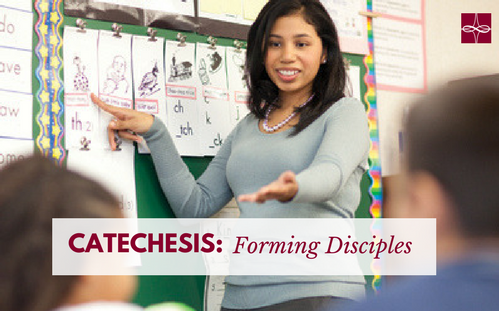

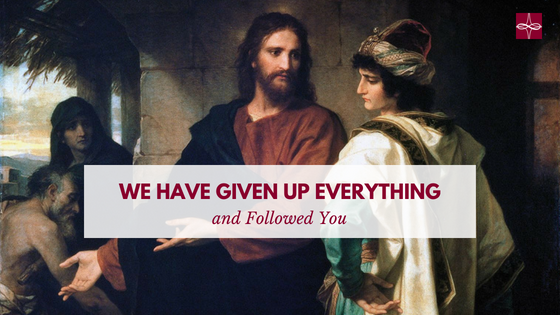
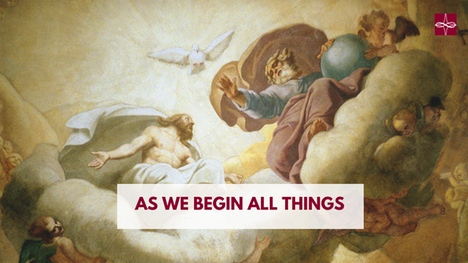
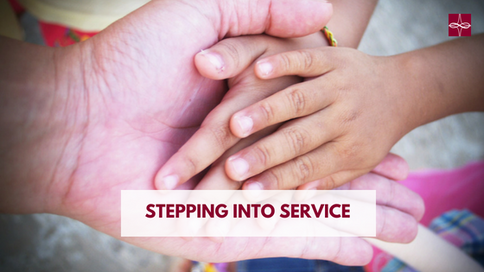
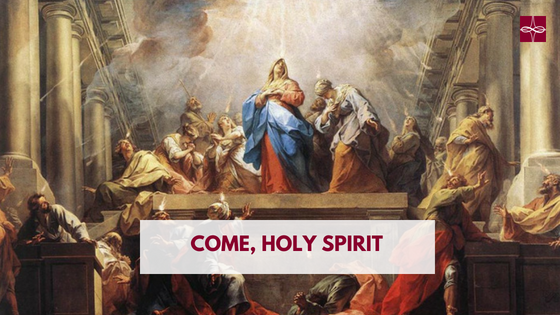

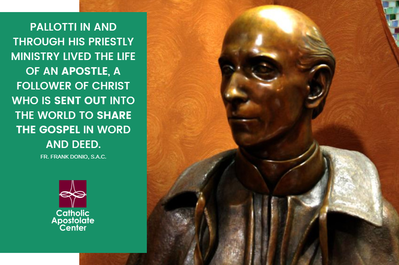
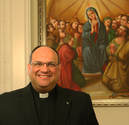
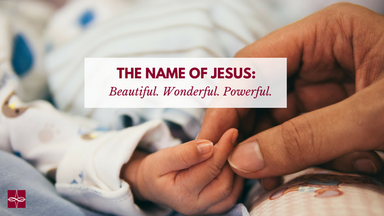

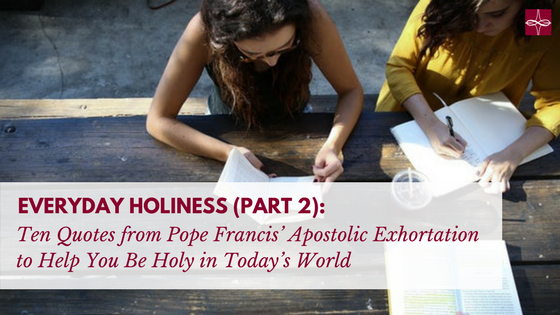

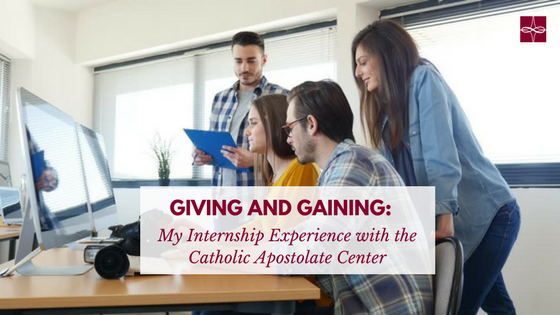

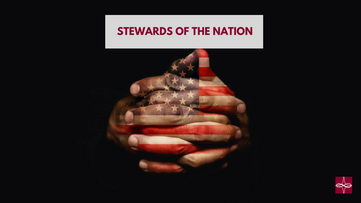

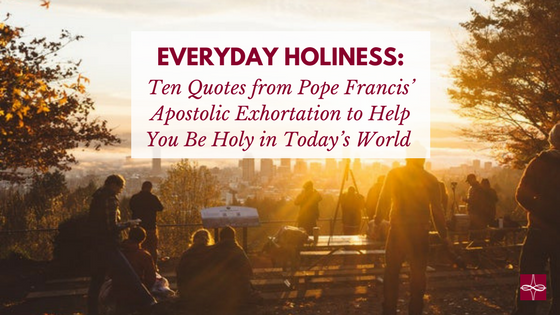

 RSS Feed
RSS Feed